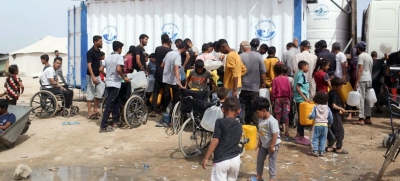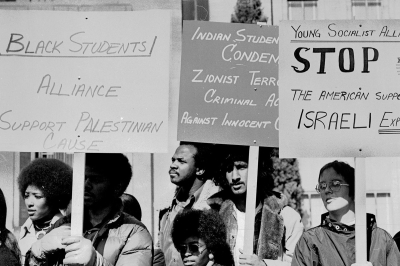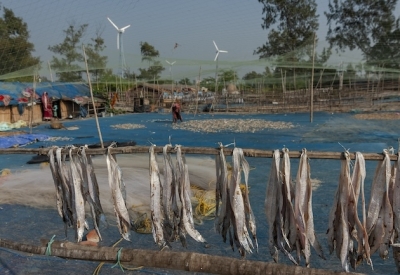Ecuador, according to its president Daniel Noboa, is now “in a state of war.” Earlier this week he had announced a state of emergency after the leader of one of the country’s top two gangs escaped from prison. The following day, armed gang members stormed the TC Television news program, broadcasting their hostage-taking and violence live to make an announcement of their own.
It was far from the only act of shocking violence the country has suffered this week.
In what appeared to be a coordinated campaign Tuesday — and one with a brazenness that recalled Mexico’s cartels in the mid-2010s, or worse — armed men stormed hospitals, businesses, and universities. Prisons were taken over in violent riots, bombs were set off in multiple locations, and police and prison guards were kidnapped and murdered. At least 10 people were killed in gang attacks, including police, and over a hundred prison staff were taken hostage.
It may seem like an inexplicable turn for Ecuador, a country that many experts, including Felipe Botero, a program head at the Global Initiative against Transnational Organized Crime, told Vox used to be an “island of peace” in an often-troubled region.
But this turn to violence in an upper-middle-income country of 18 million didn’t happen overnight.
While there are factors that accelerated a spike in crime over the last couple of years, experts say this is a story nearly a decade in the making. Ecuador’s security crisis is the product of years of growing impunity enjoyed by gangs, the influence of transnational crime groups, shifts in global cocaine consumption, and, above all, increasing institutional corruption.
That means even with President Noboa’s promised military crackdown, this chaos won’t be solved overnight.
How Ecuador went from an “island of peace” to a crisis of this level, briefly explained
For decades, Ecuador’s stability and security distinguished it from its neighbors, Peru and Colombia, the largest cocaine producers in the world. Sandwiched between the two, Ecuador often acted as a drug transit country, but it did not suffer from the violence and armed conflict that plagued its neighbors.
In the 1990s, Ecuador’s drug trade “was controlled top-down by the FARC” — the Fuerzas Armadas Revolucionarias de Colombia, the Marxist guerrilla group that waged a 50-year struggle against the Colombian government — and “there wasn’t a ton of competition and there weren’t really any clashes with the Ecuadorean state” says Will Freeman, a fellow for Latin America studies at the Council on Foreign Relations. “It was a stable situation.”
Then in 2016, the FARC largely demobilized — a historic peace process for Colombia, but also one that created a power vacuum in northern Ecuador. Simultaneously, cocaine demand started shifting drastically, declining in the US and surging in Europe, where since 2016 cocaine seizures have quadrupled, according to Freeman. “That’s made control of ports much more important,” he says, as cocaine headed for Europe is loaded into shipping containers. “Obviously, you’re not flying little planes from Colombia to France.”
And, well, Ecuador has some great ports for cocaine smugglers — specifically Guayaquil on the Pacific coast, the country’s largest port city and now the epicenter of the violent crisis.
:no_upscale()/cdn.vox-cdn.com/uploads/chorus_asset/file/25219857/GettyImages_1915253986.jpg)
This joint power vacuum and massive trafficking opportunity invited foreign groups like Mexican cartels and Venezuelan gangs to play a larger role in Ecuador’s drug trade. Even the Albanian mafia, Freeman says, capitalized on the FARC’s demobilization and flooded into Guayaquil to set up shop in the 2010s.
Ecuador’s two largest gangs, Los Lobos and Los Choneros, had long maintained an uneasy peace, but assassinations of gang leaders in 2020 sparked a power struggle. Since then, the groups have rapidly splintered into factions vying for control of territory, particularly Guayaquil, says Glaeldys González Calanche, a fellow at the International Crisis Group.
Experts said those foreign criminal groups took sides among Ecuador’s gangs, further fueling the turf war. “Los Lobos are believed to be tethered to the Jalisco New Generation Cartel, while Los Choneros are purportedly in alliance with the Sinaloa Cartel,” both out of Mexico, she adds. “Splinter groups are now locked in a fierce competition for control of domestic consumer markets and trafficking routes, further fueling the cycle of violence.”
This has all had terrifying effects for the country.
For years, Ecuador had one of the lowest murder rates in the region, but homicides have more than quadrupled since 2018. Bombings, assassinations, and shootouts have proliferated. In 2022, when headless corpses were found suspended from a bridge in the city of Esmeraldas, some analysts concluded that the kind of cartel violence that terrorized Mexican cities like Juarez in the 2000s had found a new home in Ecuador. Last year, a presidential candidate, who had reportedly received threats from the local affiliates of the Sinaloa cartel, was assassinated.
While former President Guillermo Lasso attempted to crack down on gangs, increasing police presence and even deploying the military failed to contain the violence. From 2022 to 2023, Ecuador’s murder rate nearly doubled.
Experts and former local officials say that not only has the government failed to curtail the violence, it may be abetting it as well.
“State actors are facilitating the operation of organized crime,” Botero says, pointing to the attorney general’s raids on the homes of judges, prosecutors, and police last month, which led to the arrest of dozens of officials linked to organized crime, including even a former drug czar and a president of the judicial council. “The state and law enforcement entities cannot control the situation of criminality and violence” he says, because “they are involved with organized crime in the country.”
This week’s crisis only underscores that point: Experts told Vox it seemed apparent that the prison escape Sunday that prompted Noboa’s emergency declaration was carried out with ease; Choneros kingpin Adolfo “Fito” Macías fled on the very day he was supposed to be transferred to a new maximum security prison. Then on Monday, a leader of the Los Lobos gang, Fabricio Colón, also disappeared from his cell.
“The [cartels] actually command the prisons,” says Daniela Chacón, who served as vice mayor of Quito from 2014 to 2016 and as a city councilor from 2014 to 2019, pointing to Fito’s escape. Chacón says recent events are “a show of control and power from organizations that have been already accustomed to running the show the past few years.”
Can Ecuador reverse course?
Noboa on Tuesday said Ecuador is in an “internal armed conflict,” issuing a decree that designated over 20 gangs as terrorist groups and authorized Ecuador’s military to “neutralize” them.
While Noboa has declared war, Chacón says the military can’t fix institutional corruption, warning: “The armed response will only go so far when you are fighting organizations that have more money, more power, that move more quickly, than the state does.”
:no_upscale()/cdn.vox-cdn.com/uploads/chorus_asset/file/25219858/GettyImages_1917459522.jpg)
“The Ecuadorian people are rightly clamoring for effective, firm government and a state role in quelling this violence and returning what, for most Ecuadoreans, was a sense of peace and security,” says John Walsh, director for drug policy at the Washington Office on Latin America, but he warns that the militarization of Ecuador’s law enforcement might also spawn new threats to security. Fighting organized crime in ways that skirt the rule of law, Walsh argues, “may achieve a short-term semblance of victory, but ultimately it’s serving the aims of those who would destroy and co-opt the state to begin with, and it will leave everybody less secure.”
Noboa has been vocal about his admiration of Salvadoran President Nayib Bukele, pledging last week to build massive prisons modeled after Bukele’s. Bukele was elected in 2019 promising to end the gang violence epidemic that contributed to El Salvador once having the highest murder rate in the world; he has largely done so via a campaign of mass arrests that has made him domestically popular even as it has been criticized for widespread human rights abuse. Noboa’s state of emergency, which curtails civil liberties, would also seem to take a page out of Bukele’s security policy: The Salvadoran president has extended a similar state of exception since March 2022.
Walsh also points to the failure of militarized approaches in Colombia and Mexico, and warns that “militarized operations put civilian populations at elevated risk of being caught in the crossfire as both sides — the state and organized crime — seek to escalate the conflict.”
Walsh sees Ecuador’s crisis as a regional and international problem, inextricably tied to the global cocaine market. Ecuador has already been transformed. The widespread, coordinated violence and brazen show of force by the country’s gangs this week reveal that Ecuador has already become a new epicenter for drug cartel violence and conflict.
The violence is “starting to be normalized,” says Chacón, the former vice mayor of Quito. “There is this feeling of hopelessness, that the situation will not change.”
Noboa’s declaration of an “internal armed conflict” signals the same militarized approach that failed to stem cartel violence in Mexico and Colombia. Experts say Ecuador needs to first address the systemic corruption and infiltration of state institutions that have allowed gangs to amass their power. And really, Walsh says, a new regional approach that addresses the international nature of narcotrafficking is needed to ensure Ecuador does not continue down the path of spiraling violence that has destabilized its neighbors — including rethinking drug prohibition altogether.
“We need to see this as a tragedy that’s not likely to limit itself to Ecuador but may also already be spreading,” Walsh says. “There’s no reason to think Ecuador is where this ends.”
“That should be an extremely sobering thought,” he adds. “And rather than trying to counteract these developments with the tools and strategies that have failed disastrously in the past, we need new ways of thinking and in particular to challenge drug prohibition as an enabler of the organized crime and corruption that we are supposedly trying to tackle.”






